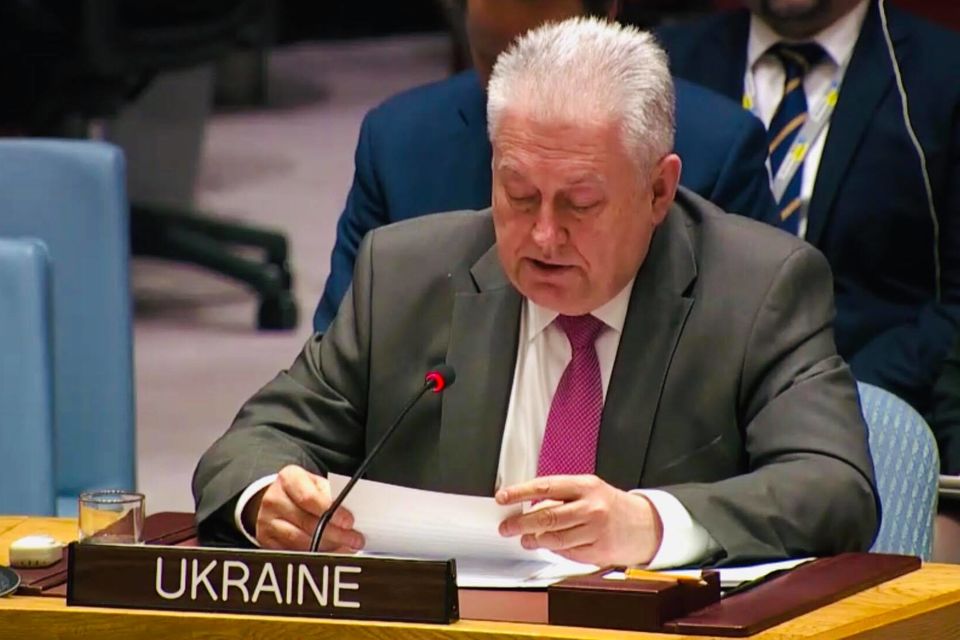Виступ делегації України на відкритих дебатах РБ ООН щодо захисту цивільних осіб у збройних конфліктах

Mr. President,
I would like to express my appreciation to the Indonesian presidency for holding an open debate on the protection of civilians in armed conflict.
I would also like to thank UN Secretary-General Antonio Guterres for presenting his report on the issue.
Ukraine also aligns itself with the statement by the European Union.
Unfortunately, since the first Security Council open debate on the protection of civilians in armed conflict twenty years ago little has changed. We have 14 Secretary-General Reports with more than 200 recommendations on this issue, but we still cannot secure the protection of the most vulnerable strata of the population.
Development of new technologies in recent years should have improved the ability of the international community to protect the humanity form the devastating consequences of the war. Yet, these technologies are building the world that pays little heed to demands of reality.
And the reality is that the global and human security have deteriorated markedly in the past decade. The indicators of peace and security continued to regress, bringing deliberate act of violence against those protected under the international humanitarian law to new heights.
It is therefore imperative that the cornerstones of international humanitarian law adopted and recognised by the international community are fully respected and protected from any attempts to derail them.
Accountability for war crimes, violations of international humanitarian law and violations and abuses of human rights should become a “new normality”.
Mr. President,
Regrettably, Ukraine has become an example of the consequences of violation by one of the Permanent Members of the Security Council of norms and principles of international law, including International Humanitarian Law.
In this regard, we value the fact that the report of the Secretary-General on the protection of civilians reflects the dire situation of the civilians affected by the Russian military aggression in the Donbas in Ukraine.
The Russian-led war in Donbas turned the lives of the civilian population into a vortex of destruction and death. The death toll among civilians, according to the OHCHR, is as of now over 3300. Every third killed civilian is a woman or child.
Just in February this year, a bus carrying civilians was blown up near Olenivka village, Donetsk region. As a result of an anti-tank mine explosion, two civilians died on the spot.
The hostilities also threaten the population with unprecedented environmental catastrophe not only for Ukraine, but for the whole Europe.
In the Donbas region, an ever-present risk from groundwater pollution and subsidence, due to improper closures and subsequent flooding of coalmines, highlight the need to take necessary measures to prevent an environmental disaster.
Here, the decision by the Russian occupation authorities to cease groundwater pumping at the YunKom mine, used in Soviet times for nuclear testing, endangers groundwater, rivers and ultimately the Sea of Azov with the radioactive contamination.
Moreover, the Donetsk filtration station, an object that contains huge stocks of chlorine, remains under constant shelling by the Russian occupation forces. An accident at this station can be of a scale similar to Chernobyl disaster.
Russia continues to plant landmines, and unexploded remnants of war keep multiplying in the temporarily occupied territories of Donetsk and Luhansk regions, especially in densely populated areas. This has already made Ukraine one of the most landmine-contaminated countries in the world.
Almost half of the civilian deaths have been caused by landmines.
As a Party to the Geneva Convention IV Relative to the Protection of Civilian Persons in Time of War (1949) and its Additional Protocols, Ukraine attaches great importance to enhancing the protection of civilians in armed conflict.
The recently adopted Mine Action Law establishes the framework for humanitarian demining in Ukraine, which allows minimizing the risks for people living in mine-contaminated areas of Donetsk and Luhansk regions.
Mr. President, Ukraine is deeply concerned at the provocative and unlawful decision to issue Russian passports to Ukrainian citizens in the temporarily occupied territories of Ukraine. This step could further curtail human rights of the local civilian population and provoke the dangerous escalation of the situation.
We have to recall that imposing citizenship on residents of an occupied territory can be equated to compelling them to swearing allegiance to a power they may consider as hostile, which is forbidden under the Fourth Geneva Convention.
In view of all the above, this dangerous development has to be duly reflected and assessed in a next Secretary-General’s report.
Time and again, we urge Russia to uphold all of its obligations under applicable international law as occupying power.
In conclusion, Mr. President, I would like to underline Ukraine’s strong commitment to the protection of civilians and to ensuring accountability for all violations of the international humanitarian and human rights law in its territory.
I thank you.
